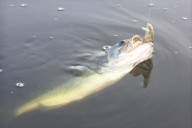Life at the Lake
a diary of living at a small lowland lakeWHAT IT'S LIKE

Early moonrise over Lake Ketchum
|
Archive Search |
| Links |
|
and s-integrator |
Who says there is no justice?
From the Everett (Washington) Herald newspaper.
"Police are investigating allegations that a 67-year-old woman stole $482,488 from a union fund during the three years she worked as its bookkeeper.
"But she told police she can pay the money back because she's won $1 million in a lottery."
- - Comments ()
...

Red Rhody is past its peak, but other colors are just coming on
I'd reported that the rhododendrons are past their prime. I'm wrong. We're only about mid-way into the azalea and rhododendron season.
And the wisteria—made famous by an old New Yorker cartoon, perhaps by Thurber, of the wife telling her husband, "Duck, dear. Here it comes again," as a fat tendril comes over the top of the fence and at him, much in the manner of a boa-constrictor—is coming into full bloom.
It is both a bane and a boon. It must be cut back all spring and summer—nearly everyday, it seems—or else it will take over our small world. But it is pretty and passing boats often call out to us about its distant beauty.
I guess, up close, it's not so bad, either. It has a certain smell to it that might be called a stink. Like a lot of strong plants that bloom at this time of the year, the smell is not totally attractive, and can be overwhelming.
So sweet spring prolongs itself. And the first truly warm weather, we are told, is on the horizon.
- - Comments ()
...

Yellow iris in the shoreline buffer
First wood duck brood sighted yesterday, several times. She has three ducklings; often the brood is small, and there is attrition to be expected, additionally. How sad it is, each year, to see the ducklings in a brood reduced one by one, till practically none are left.
But I have high hopes for these three. We sighted them early in the morning on our grassy lawn, up from the natural buffer of yellow iris, cattails, reed canary grass, etc. They were wandering around, the fuzzy little guys, pecking at the ground, feeding avidly on whatever they found there—grass seeds, probably.
Later, when I dashed out on my dock at the strike of a trout, they were on the other side of the buffer, close to the overhanging grasses, and I flushed them. The mother made a terrible alarmed noise and flew fifteen feet or so out into open water; the brood scattered in the same direction, flapping their little flightless wings and scurrying along the surface. They gathered closely about twenty feet out.
Abjectly I apologized, "Sorry, you guys," I said aloud. "Didn't know you were here."
And later I saw them streaming down the near center of the lake, the ducklings so closely in the dead-water pocket in front of her wake as to seem a minute extension of her corporal person. That is, the looked like a single, slightly elongated duck.
Which I suppose they are.
Then today three brilliant male wood ducks, complete in each other's society, streaming like ships of war down the middle of the lake. Now that the eggs are hatched, their relationship to the hen is over for the year. They will go off with other males to some secret place, forming a secret society, and . . . molt. During this brief time they will be unable to fly and are—point of fact—helpless.
- - Comments ()
...

Sumi sketch
Haiku:
nothing matters much
a tender moment in May
much as any thing
- - Comments ()
...

Dying azalea blossoms
Haiku:
blossoms on the ground
why is this significant?
lush May is passing
- - Comments ()
...

Another night, blogster's bass
Last night at dusk I am standing on my dock, casting into the lowering light for trout, when a boat appears and two guys begin talking to me. I recognize them immediately, of course. They are two old friends in fishing who recognize me as a "gray eminence." I am glad to see them; it is for the first time this year. I know the name of only one of them—Darrell. He does drywall, and I have been trying to talk him into going to college, for he is but eighteen or so, and possesses that enveloping intensity that all good fishers have and that, often, leads into nothing more in life than a lot of successfully fishing.
Darrell is a whiz at bass. He already has his own bass boat—small and not expensive, in a sport where tens of thousands of dollars can easily be spent, if you have the money. He shows all the positive signs: six or eight rods lying on the bottom of the boat, each rigged with a different kind of bait or lure; a trolling motor that he can control precisely with his feet, positioning myself just where he wants; the ability to cast precisely, whether it be with a bait-casting reel or a spinning reel. Naturally, he (as do I) prefers the bait-casting reel. It demands a skill that the other does not.
I recognized Darrel as a pro the first time I saw him. I told him about my new interest in bass, since I now live on a bass lake. You see, a dedicated fisher does not mind admitting he doesn't know something. Only a rank beginner, or amateur, would pridefully do so.
Darrel and I are too pro to contain such an attitude.
The second time I see Darrell on the lake—oh, this must be a couple of years ago—he has brought along a video tape on bass fishing. "This is for you, Bob," he tells me. "You can keep it."
This is about the kindest thing another fisherman has ever done for me. I see from the mark-down sticker on it that it hasn't cost him much, but it has indeed cost him something. And I come to understand—good as it is—that it doesn't contain anything he doesn't already know, or will have need to refer to in some dim, dark future. He is well past that point.
It was a good year for bass and very quickly I began to catch some, but not nearly as many as Darrell and his partner.
To make this short, shorter, having mastered bass (and he has, clearly), Darrell and friend discover steelhead, namely, steelhead flyfishing. And they quickly learn (perhaps from me, but probably not) that I have published three books on the subject. Now Darrell believes, along with Emerson and Thoreau, that books are for a fisher's "idle moments." They would "rather be fishing," as the bumper sticker proclaims.
I not only understand, I agree.
Darrell is not one for college, I quickly learn, and drop the subject, which in this complex world of men and boys is one you are allowed to bring up once, then expected to drop. I don?t know where it is written, but it exists as clearly and firmly in our minds as though it were etched there.
So Darrell begins to pump me on steelheading. And I—ever grateful—decide to give him a copy of my second book, which is probably the most useful, at least in Darrell's case, since it deals with technique, the use of the floating line.
This is, please note, the only copy I've ever "given" away. Writers write books in order to make money; incidental is the idea that you may help someone along the way.
Darrell, as expected, stays up all night, he tells me, reading my book. He does not finish it, he let's on, that first night, and as far as I can tell he may not have finished it at all, but I can rest assured he has gotten all he wants out of it and can apply that, if it is relevant, to any future situation. And he does.
He goes to both local and far-off places and begins catching steelhead. On a fly. He is deep into it and starts tying his own flies, which is not as difficult as the uninitiated may think it is.
So—back to the present—Darrell is anxious to tell me about his late-winter steelhead season. Though I did not fish it this year, I have heard it was tough, and not many fish were caught on the Skagit and Sauk rivers. Darrell caught fish, however, and so did his partner. I am not surprised. I would be surprised if he hadn't. They hadn't.
A good fisher catches fish, even when there are no fish to catch. One of his steelhead, he volunteers, goes about 17 pounds. What catch-and-release fishers do with a big fish is take length and girth measurements, quickly, then slide their fish back into the hungry water. They apply a formula and learn the weight of their fish down to a few ounces.
The weight of his fish is very important to a fisher, especially when he cannot keep the fish to verify its size to doubting friends.
Darrell proudly tells me of the number of Spey rods he now owns. They cost about $800 each, which represents a lot of installed drywall, I realize. I think the measure of a fisher's dedication is reflected in the number of rods he owns, and they are not cheap.
Smart-assedly I tell him, "All you need is one rod." With bass you can fish one rod after another out of a bass boat; with steelhead, you are wading, far afield, and one rod is all you can hopefully handle. And I named one of the rods he had just named as being completely adequate for all the fishing conditions he might encounter.
He knows this, as he knows that I am joshing him knowingly. I am old enough to be his grandfather. He will not go to college, I sadly realize, and will install drywall until his back goes out, as it eventually must do, but perhaps not before he is fifty. He will have nothing to fall back on then.
Oh, yes he will. He will still, I am certain, be fishing for bass or, better yet, steelhead, as the sun sinks.
So we chat kiddingly into the increasing dark, and his boat and his friend drift farther away, and I am unable to hear precisely what they are calling out to me, partly because I am hard of hearing, and partly because what they are saying, bragging about, needs no words and is only a series of happy sounds barked into the night for all and none to hear or understand.
Darrell and his friend report three bass for their short intense day's fishing. It is enough to please them, though they'd hoped for more. None of the bass was large.
One pull on my fly, with a swirl and no take, and that is it for my twilight fishing, this Sunday night in mid-May.
- - Comments ()
...

Weird sunset seen looking East
Twice a year the people who live on my lake get together and conduct business. In spring, yesterday, they elect officers, which in the past has been a joke, since the same president held uncontested office for twenty years, and those in subordinate offices were elected or replaced by acclamation.
Our former president died suddenly in August and the vice-president (my wife) served during the next nine months, during which she read all the old minutes, records of law suits, correspondence, communications with the company that treats our lake for excessive weeds because of all the dairy farmland pollutants that make it utrophic.
All this material filled several dozen cardboard boxes. Diligently, dutifully, she went through it all, as a good reference librarian (which she was, in previous life) would. In the course of doing so, she learned that (1) our constitution and bylaws were practically non-existent and greatly inaccurate when they exited at all, and about half of our Roberts Rules of Order offices had never been filled.
Most officers had nothing to do and their duties had not been defined. So she formed a committee and went through the multiple agonies of give-and-take in writing a constitution and bylaws that reflect to a degree of accuracy what actually goes on.
Yesterday the new constitution and bylaws were read aloud by the club's secretary and lightly discussed. At the second annual meeting they will be voted on and hopefully approved.
They may not be, given the vagaries of human nature and the likelihood of people disagreeing over minutiae, but then she tried and gave them something they were without and badly needed. Which is the most people can do for each other in a democracy.
A democracy is still the best and only form of governance open to people who must live and work together. The alternative—some form of tyranny—is not desired. We know about that because we had it before.
A president for twenty years? It is intolerable but it is what we had, and it is what happens when people surrender their freedom of choice in governance because of lassitude and indifference.
Yesterday we elected a new president. No, it wasn't my wife, who chose not to run. It is a new person to the lake community, a retired lawyer, a seemingly nice guy, who probably does not know what he's gotten himself into, since this is only the second meeting he has ever attended, and does not yet know the names of his fellow officers.
But to have been a successful lawyer, you have to be able to live and learn. Perhaps there is some of that left in his playbook.
- - Comments ()
...